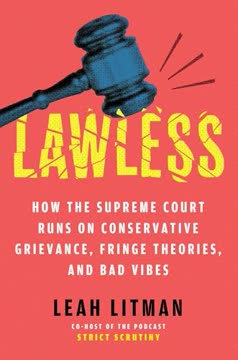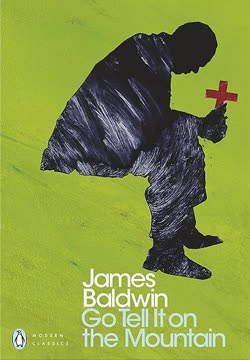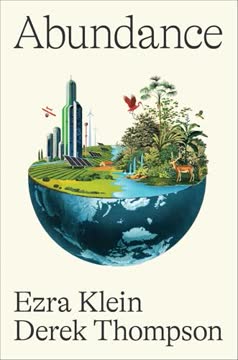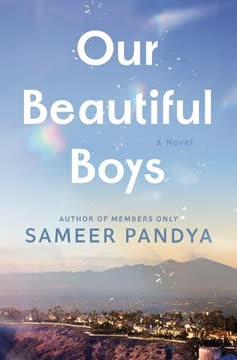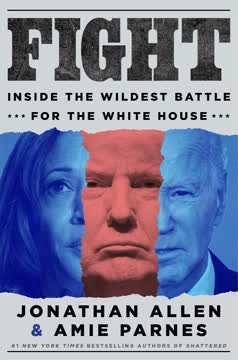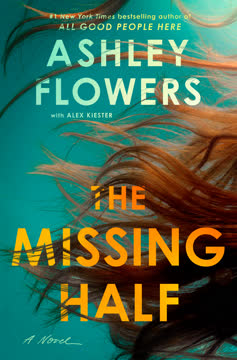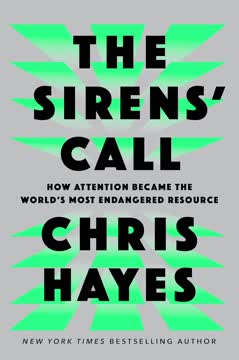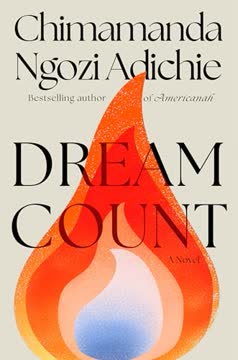Key Takeaways
1. The Supreme Court Operates on Conservative Grievance and Political Vibes, Not Just Neutral Law.
Except… it is that ridiculous. The Supreme Court is running on conservative grievance, fringe theories, and bad vibes.
Beyond the law. The book argues that the Supreme Court, particularly its Republican-appointed majority, is not a neutral arbiter of law but is instead driven by the political sentiments and grievances of the conservative movement. This perspective suggests that judicial decisions are less about objective legal interpretation and more about advancing a specific ideological agenda rooted in a sense of victimhood and a desire to restore a perceived lost status.
Conservative grievance mindset. This mindset insists that conservatives are being unfairly treated by an increasingly diverse society that no longer shares their views. Examples cited include:
- Ginni Thomas claiming conservatives are "tired of being the oppressed minority."
- Justices arguing that allowing gay marriage marginalizes those with "traditional ideas."
- Republicans feeling wronged by dwindling support for their views on feminism, race, and democracy.
Vibes over facts. The author contends that these feelings and "bad vibes" are translated into legal opinions that resemble "Republican fan fiction," mixing law, fantasy, and "alternative facts." This approach allows justices to prioritize their innermost feelings or the atmosphere of conservative gatherings over conventional legal sources, leading to outcomes that align with partisan talking points rather than established legal principles.
2. The Court's Decisions Systematically Roll Back Rights for Historically Marginalized Groups.
As this suggests, the Supreme Court is extremely powerful. It is also poorly understood. The combination makes the Court pretty dangerous.
Targeting civil rights. The book highlights a pattern where the Court's conservative majority consistently issues decisions that diminish the rights and standing of groups that have historically faced discrimination. This includes:
- Overturning the constitutional right to abortion.
- Chipping away at protections against discrimination for LGBT individuals.
- Dismantling key provisions of the Voting Rights Act.
Undermining equality. These decisions are presented not as isolated legal interpretations but as part of a broader project to reverse progress made during earlier civil rights movements. The author argues that the Court is actively working to dismantle the civil rights of historically marginalized groups, often by reinterpreting laws and constitutional provisions in ways that disadvantage these populations and favor conservative interests.
Real-world harm. The consequences of these rulings are depicted as causing tangible harm to real people. Examples include:
- Women being denied medically necessary abortions and suffering severe health consequences or death.
- Businesses being allowed to discriminate against LGBT individuals based on religious objections.
- Voters facing increased barriers to accessing the ballot box.
3. Minority Rule in the Political System Enables the Court's Increasingly Fringe Agenda.
The short answer is the politics of minority rule.
Insulation from the majority. The book argues that the Supreme Court's insulation from democratic accountability (justices are appointed for life) is exacerbated by structural features of the U.S. political system that enable minority rule. These features allow a political minority to gain and wield power disproportionate to its popular support.
Mechanisms of minority rule:
- Electoral College: Allows a candidate to win the presidency without winning the popular vote, enabling the appointment of justices favored by a minority of voters.
- Senate Representation: Gives states with small populations the same number of senators as large states, meaning senators representing a minority of the population can confirm judicial nominees.
- Judicial Appointments: Justices are appointed, not elected, and serve for life, making them unresponsive to shifts in public opinion or electoral outcomes.
Fringe positions elevated. This system allows a political party representing a minority of the country to appoint justices who reflect increasingly fringe positions. The author points out that Republican appointees confirmed by senators representing less than a majority of Americans have been instrumental in decisions that are widely unpopular with the public, such as overturning Roe v. Wade.
4. Legal Theories and Jargon Are Used to Mask the Court's Political Project.
Jargon-heavy rules and interpretive methods (textualism! originalism! semantic canons!) seem to suggest “Well, you normies just don’t understand, so leave it to us law wizards.”
Obscuring the agenda. The book suggests that the Court uses complex legal terminology and interpretive methods to create an illusion of neutrality and expertise, making its decisions seem apolitical and beyond the understanding of ordinary citizens. This "shell game" makes it harder for the public to recognize the political nature of the Court's jurisprudence.
Overlap with political philosophy. The author argues that these legal methods are not neutral tools but often align with and advance specific political projects. Examples include:
- Originalism: A method focused on restoring the past, which can align with a political project seeking to return to a time with more rigid social hierarchies.
- Major Questions Doctrine: An interpretive theory that places a thumb on the scale against corporate regulation, aligning with the Republican preference for limited government and less industry oversight.
"Law wizards" facade. By framing decisions in terms of these technical methods, the Court can dismiss public criticism as a lack of understanding, reinforcing the idea that only legal experts can grasp the complexities of constitutional law. However, the book contends that the overlap between these methods and partisan political goals is often significant and intentional.
5. The Overturning of Roe v. Wade Represents a "Ken-surrection" to Restore Patriarchy.
The Supreme Court’s decision to eliminate a woman’s right to reproductive freedom was a Ken-surrection—a move to restore a patriarchy where men are on top.
Reversing progress. The book frames the overturning of Roe v. Wade in Dobbs as a deliberate effort to roll back women's rights and restore a patriarchal social order. This decision is seen as the opening salvo in a broader fight against feminism and women's sexual liberation.
Historical roots. The author traces the origins of this "Ken-surrection" to America's history of patriarchy and the backlash against the feminist movement. The resistance to women's full participation in economic, social, and political life, and the discomfort with women's control over their fertility, fueled a political strategy that targeted reproductive rights.
Originalism as a tool. The book argues that Republican justices channeled these anti-feminist sentiments through the jurisprudential method of originalism. By insisting that the Constitution only protects rights "deeply rooted in this Nation’s history and tradition," the Court could justify denying women rights they did not possess in the 1700s and 1800s, effectively making the patriarchy "great again."
6. The Court Is Dismantling LGBT Equality Based on Conservative Grievance and False Claims of Victimhood.
Over time, the Supreme Court’s decisions came to embrace these feelings. In 2023, in 303 Creative v. Elenis, the Republican justices relied on the First Amendment to hold that states could not prohibit a wedding website designer from discriminating against weddings that celebrated same-sex marriages.
Undoing equality. The book argues that the Court is actively undoing legal protections for the LGBT community, often by reinterpreting civil rights laws and the First Amendment. Decisions like 303 Creative are presented as examples where the Court inverts concepts of discrimination, treating efforts to guarantee equality for LGBT people as discrimination against religious conservatives.
Conservative "burn book". This approach is fueled by a "conservative grievance" narrative that portrays religious and social conservatives as victims of a "Big Gay Conspiracy" and societal progress on LGBT rights. The author highlights how figures like Anita Bryant and Justice Scalia have voiced fears that the mere existence of LGBT people threatens opponents of equality.
Weaponizing the First Amendment. The Court is using the First Amendment, particularly religious freedom and free speech claims, as a vehicle to chip away at anti-discrimination laws. By framing refusal to serve LGBT individuals as protected speech or religious exercise, the Court legitimizes discrimination while insisting that religious conservatives are the real oppressed group in need of judicial protection.
7. The Court Undermines Voting Rights to Consolidate Minority Political Power.
Shelby County ended one of the crown jewels of the civil rights movement—a key Voting Rights Act protection that blocked voter discrimination by requiring certain states to preclear changes in their voting policies with the federal government.
Attacking democracy. The book contends that the Court is actively working to dismantle voting rights protections, particularly those benefiting racial minorities, as part of a long-standing effort by white Southern conservatives and the Republican Party to maintain political power through minority rule. The decision in Shelby County is highlighted as a pivotal moment in this project.
Resurrecting old arguments. The author shows how the Court's reasoning echoes arguments used by segregationists and Republican politicians like Nixon and Reagan against the Voting Rights Act. These arguments frame voting rights protections as unfair regional punishment or "racial entitlements," ignoring the history of violent voter suppression and the need to address ongoing discrimination.
Enabling suppression and gerrymandering. By weakening the VRA and refusing to address partisan gerrymandering (Rucho v. Common Cause), the Court has enabled states to enact policies that disproportionately disenfranchise voters of color and dilute minority voting power. This makes it harder for voters to hold politicians accountable and entrenches the power of a political minority.
8. The Court Enables Oligarchy by Allowing Wealthy Donors Outsize Influence in Politics.
The result? A government of, by, and for the rich.
Money equals speech. The book argues that the Court's campaign finance decisions, particularly Citizens United, have dismantled regulations designed to limit the influence of wealth in politics. By equating money with speech and striking down limits on corporate and individual political spending, the Court has created a system where the mega-rich can buy disproportionate influence and access.
Ignoring corruption. The author criticizes the Court's narrow definition of corruption, which largely ignores the reality that massive political spending and access can lead to undue influence and favor-trading. Decisions like McDonnell v. United States are cited as examples where the Court dismisses actions that appear corrupt as merely "how politics works."
A broligarchy. This jurisprudence creates an "oligarchy" or "broligarchy" where political officials are more accountable to wealthy donors than to ordinary voters. The book highlights the vast sums of dark money flowing into politics and the unparalleled access wealthy donors like Harlan Crow and the Koch brothers gain to political leaders, including the justices themselves.
9. The Court Attacks the Administrative State to Benefit Industry and Limit Government.
In 2022, Gorsuch and five other Republican justices announced a jurisprudential theory, the major questions doctrine, that embodies Republicans’ deregulatory philosophy.
War on government. The book describes the Court's campaign against the federal administrative state (agencies like the EPA, FDA, etc.) as part of a broader Republican political philosophy of limited government and less industry regulation. This project seeks to dismantle the parts of government responsible for implementing complex policies and protecting public health, safety, and the environment.
Deregulatory doctrines. The Court is using new or revived jurisprudential theories to hobble agencies. Examples include:
- Major Questions Doctrine: Requires Congress to "speak clearly" when authorizing agencies to make "major" or controversial regulations, effectively creating a presumption against significant agency action.
- Overruling Chevron: Eliminates judicial deference to agencies' reasonable interpretations of ambiguous statutes, shifting interpretive power to the courts, which are often hostile to regulation.
Prioritizing industry interests. The author argues that these doctrines are designed to benefit corporate interests seeking to avoid regulation. By transferring decision-making power from expert agencies to generalist courts, the Court ensures that ambiguities in law are resolved in favor of deregulation, even when it contradicts statutory text or public need (e.g., climate change, student debt relief).
10. Fixing the Court Requires Political Action, Organizing, and Voting, Not Just Legal Arguments.
Persuading people to care about the courts is how change happens.
Beyond legal arguments. The book concludes that relying solely on legal arguments within the existing system is insufficient to address the problems with the Court. Since the Court is driven by politics and vibes, changing its trajectory requires engaging in political action outside the courtroom.
Empowering democracy. The path forward involves strengthening democratic processes and making the Court more accountable to the people. Strategies suggested include:
- Voting: Participating in every election at every level (local, state, federal) to elect politicians who will appoint different kinds of judges.
- Advocacy and Organizing: Talking to friends, family, and networks about the importance of the courts and pressuring politicians to prioritize judicial appointments and potential reforms.
- Court Reform: Advocating for structural changes like term limits or Court expansion to rebalance the judiciary and limit its ability to obstruct democracy.
Learning from opponents. The author suggests learning from the Republican legal movement's success in using long-term political strategy, organizing, and grievance to achieve its goals. While rejecting their antidemocratic tactics, progressives can adopt their focus and persistence to build a constituency for a more democratic and accountable judiciary.
Last updated:
FAQ
What is Lawless: How the Supreme Court Runs on Conservative Grievance, Fringe Theories, and Bad Vibes by Leah Litman about?
- Supreme Court’s conservative shift: The book examines how the U.S. Supreme Court, dominated by a conservative majority, operates on political grievance, fringe legal theories, and “bad vibes” rather than neutral legal principles.
- Impact on democracy and rights: Litman details how the Court’s decisions have reshaped American law, affecting abortion, LGBT rights, voting rights, campaign finance, and the administrative state, often favoring conservative and wealthy interests.
- Law and politics intertwined: The book argues that legal doctrines like originalism are used to advance political projects, undermining democracy and civil rights.
- Cultural analogies and critique: Litman uses pop culture references to illustrate the Court’s dynamics and calls for public engagement and reform to restore democratic accountability.
Why should I read Lawless by Leah Litman?
- Demystifies Supreme Court power: The book provides a clear, accessible analysis of how the Court’s decisions shape American law, politics, and everyday life.
- Reveals conservative motivations: Litman explains the mindset and strategies of conservative justices, helping readers understand current legal and political conflicts.
- Empowers civic engagement: By breaking down complex legal doctrines, the book equips readers to advocate for change and participate meaningfully in democracy.
- Timely and comprehensive critique: With recent controversial rulings, Lawless offers essential context and a roadmap for reform, making it vital for concerned citizens.
What are the key takeaways from Lawless by Leah Litman?
- Conservative majority reshapes society: The Supreme Court’s Republican-appointed justices use legal doctrines and political grievance to dismantle rights related to abortion, LGBT equality, voting, and campaign finance.
- Law and politics are inseparable: Jurisprudential methods like originalism serve conservative political agendas, not neutral legal interpretation.
- Democracy and civil rights threatened: The Court’s rulings enable minority rule, voter suppression, and economic oligarchy, undermining equal participation and protection.
- Decoding legal “vibes” is crucial: Litman urges readers to look beyond legal jargon to the political and historical context behind the Court’s decisions.
What is the “conservative grievance” mindset described in Lawless by Leah Litman?
- Victimhood narrative: Conservative justices see themselves and their allies as an oppressed minority in a changing, diverse society, fueling a desire to restore traditional dominance.
- Legal reflection of politics: This grievance is channeled into jurisprudence, resulting in rulings that favor conservative political goals and often harm women, racial minorities, and LGBT people.
- Examples in action: Litman cites statements from figures like Virginia Thomas and Justice Alito to illustrate how this mindset shapes legal reasoning and outcomes.
- Impact on Court decisions: The grievance mindset justifies decisions that roll back civil rights and entrench conservative power.
How does Leah Litman define and critique “originalism” in Lawless?
- Definition of originalism: Originalism interprets the Constitution as meaning today what it meant to its drafters, resisting changes in societal values.
- Political tool for patriarchy: Litman argues that originalism is used by conservatives to restore traditional family values and limit rights, especially for women and marginalized groups.
- Judicial and political symbiosis: The method aligns with conservative political projects, justifying reversals of precedents like Roe v. Wade and opposing gender equality.
- Dog whistle for rollback: Originalism serves as coded language for rolling back social progress under the guise of legal fidelity.
What is the “Ken-surrection” and how does it relate to Lawless by Leah Litman?
- Ken-surrection defined: The term refers to the Supreme Court’s rollback of women’s rights, especially abortion, as a move to restore male dominance—drawing on the Barbie movie’s plot for analogy.
- Legal and political origins: Litman traces this backlash to historical patriarchy and Republican strategies to appeal to traditional family values.
- Originalism as a tool: The conservative majority uses originalism to justify this counterrevolution against women’s rights.
- Real-world consequences: The book recounts tragic cases, like forced hysterectomies, to illustrate the human cost of these legal changes.
How does Lawless by Leah Litman explain the Supreme Court’s impact on LGBT rights?
- Backlash and grievance: The Court’s conservative justices frame advances in LGBT equality as discrimination against religious and social conservatives.
- Key cases discussed: Litman analyzes cases like Obergefell v. Hodges, Masterpiece Cakeshop, and 303 Creative v. Elenis, showing how the Court enables discrimination under free speech and religious freedom claims.
- Persecution complex: The Court’s jurisprudence reflects a narrative that conservatives are the real victims, despite public support for LGBT rights.
- Erosion of protections: These rulings chip away at civil rights for LGBT people, prioritizing conservative grievances.
What does Lawless by Leah Litman say about the Supreme Court’s role in voting rights?
- Shelby County’s impact: The book highlights how the 2013 decision gutted the Voting Rights Act, enabling voter suppression and gerrymandering.
- Facilitating minority rule: The Court’s decisions allow partisan gerrymandering and restrictive voting laws that disproportionately affect minorities.
- Embrace of fringe theories: Litman discusses the independent state legislature theory, which could further insulate restrictive state laws from judicial review.
- Connection to election legitimacy: The book links the Court’s rulings to broader attacks on election integrity, including the 2020 election challenges.
How does Lawless by Leah Litman analyze the Supreme Court’s approach to campaign finance and economic inequality?
- Favoring the wealthy: The Court consistently sides with powerful interests, shaping laws that allow the mega-rich to influence politics.
- Key cases like Citizens United: Litman discusses how decisions have removed limits on political spending, enabling unlimited corporate and individual influence.
- Narrowing corruption definitions: The Court redefines corruption so narrowly that most influence and access schemes are left unregulated.
- Creation of a “broligarchy”: The book argues that these rulings create a system where money equates to political power, undermining democratic equality.
What is the “major questions doctrine” and how does Leah Litman critique it in Lawless?
- Doctrine defined: The major questions doctrine holds that courts should be skeptical of agency actions with significant economic or political impact unless Congress clearly authorizes them.
- Tool for deregulation: Litman explains that the doctrine is used to invalidate major regulatory initiatives, limiting government’s ability to address issues like climate change and public health.
- Politicization of interpretation: The doctrine allows the Court’s political preferences to determine which regulations are struck down, sidelining traditional legal methods.
- Long-term consequences: This undermines the administrative state and shifts power to ideologically driven courts.
How does Lawless by Leah Litman describe the relationship between Supreme Court justices and wealthy donors or political actors?
- Close ties and perks: The book reveals justices, notably Clarence Thomas, accepting luxury trips and gifts from wealthy donors, raising ethical concerns.
- Supportive conservative networks: Wealthy donors and organizations create a network that validates and props up the justices’ unpopular views.
- Federalist Society’s influence: Figures like Leonard Leo coordinate funding, nominations, and ideological support to maintain a conservative legal movement.
- Legitimacy and accountability issues: These relationships blur the lines between judicial independence and political influence, undermining public trust.
What practical advice and reform methods does Leah Litman offer in Lawless for addressing the Supreme Court’s trajectory?
- Advocacy and education: Litman urges readers to educate themselves and others about the Court’s role, engage in conversations, and build a movement for accountability.
- Voting and elections: She emphasizes the importance of voting in all elections, including local and judicial races, to influence the judiciary’s direction.
- Court reform proposals: The book discusses reforms like term limits, court expansion, and jurisdiction-stripping to limit the Court’s power.
- Long-term commitment: Litman acknowledges that change requires sustained effort but encourages persistence, noting that public pressure can shift attitudes and outcomes.
What are the best quotes from Lawless by Leah Litman and what do they mean?
- “The Supreme Court is running on conservative grievance, fringe theories, and bad vibes.” This encapsulates the book’s thesis that the Court’s decisions are driven by political resentment and ideology, not sound legal reasoning.
- “The Court’s decisions have forced women to bleed out in hair salons and beg for medical care that could save their lives.” This stark quote highlights the real human harm caused by the rollback of abortion rights.
- “The Court is making the law less democratic and less inclusive.” Litman emphasizes that the Court’s jurisprudence undermines majority rule and civil rights.
- “The Court’s ‘reasoning’ on corruption is nothing more than evidence-free diktats about how government and democracy work.” This critiques the Court’s detachment from reality in campaign finance rulings, showing its disregard for the corrupting influence of money in politics.
Review Summary
Lawless receives mostly positive reviews for its accessible analysis of the Supreme Court's conservative shift. Readers praise Litman's use of pop culture references to explain complex legal concepts, though some find them excessive. The book is lauded for its thorough research and engaging style, making it suitable for both lawyers and general readers. Critics note its clear liberal bias and dense content. Overall, reviewers commend the book for its timely examination of the Court's impact on American democracy and its call to action for readers.
Similar Books
Download PDF
Download EPUB
.epub digital book format is ideal for reading ebooks on phones, tablets, and e-readers.
